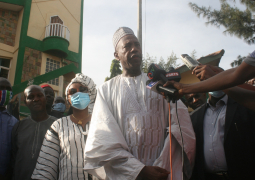
“If The Gambia government gives me suitable land I am willing to come back home to invest heavily in agriculture,” Ms Dukureh said, adding: “I am willing to sell everything I have in the United States of America and come back home to invest in agriculture.”
Speaking to journalists at the Bakau Women Garden on Tuesday, the renowned Gambian women's rights activist and anti-female genital mutilation campaigner added: “If I have a dream now in life is to become a farmer. And if the Ministry of Agriculture wants to partner me, I want to have a bigger farm to benefit the country and Gambian women. I also want to link Gambian women with farmers in Latin America.”
Ms Dukureh believes she can become a billionaire through investment in agriculture. She says that if she gets serious with farming and puts in the needed effort, she will attain her aspirations and become an exemplary farmer in the country.
Speaking further, she said she would not want to stop just at cultivating crops and vegetables but would also process her products to ensure Gambians consume their own foodstuffs rather than depending on importation.
Dukureh, also a philanthropist who supports women gardeners, said her proposed huge investment in agriculture would create job opportunities for Gambian youth and women as well as enhance socio-economic growth.
The renowned activist believes there is a greater need for Africans to cultivate and process their own foodstuffs, saying countries of the continent, especially The Gambia, have vast suitable land for agriculture and enough rain and sunlight to embark on commercial farming.
However, she said the country’s agriculture drive “is weak” due to the fact that farmers lacked advanced farming machines to embark on commercial farming.
“The reason agriculture is not developed is because farmers use simple farm tools to cultivate crops. So, they are not expected to make much money,” she reasons, saying: “But if the farmers have advanced machines like tractors they will do well. We need to be of a higher standard to compete with other parts of the world.”


